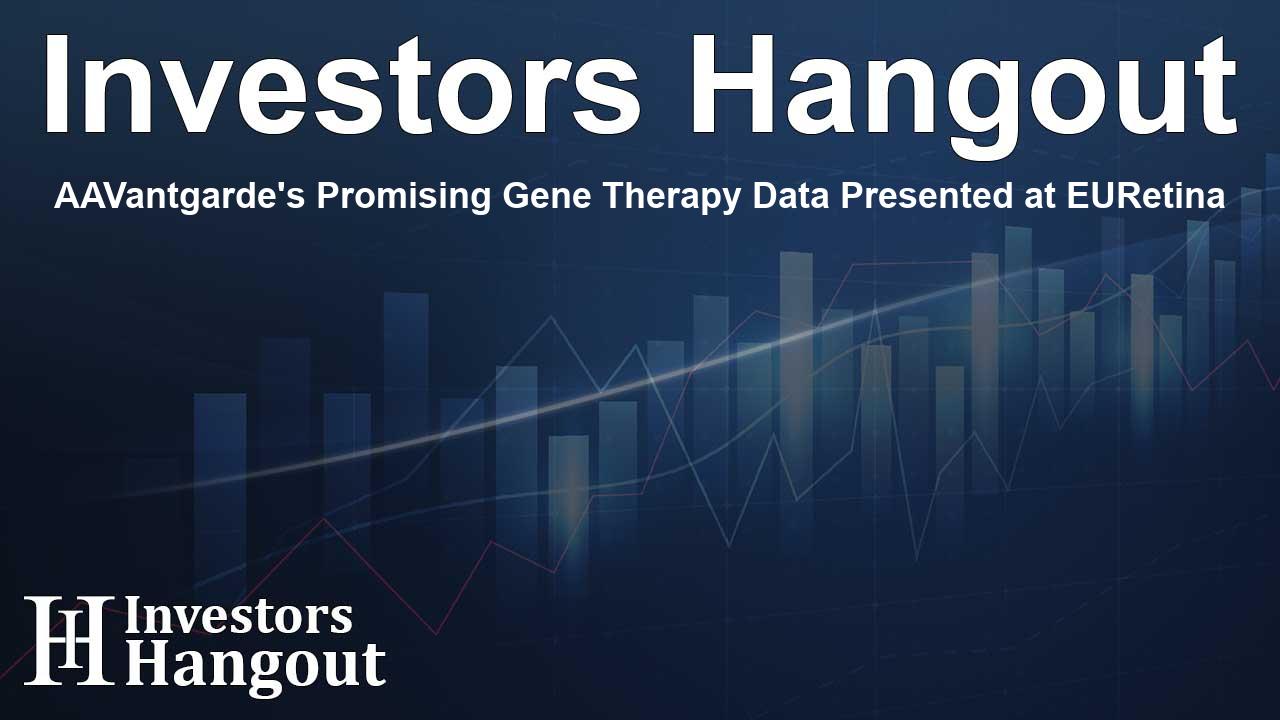AAVantgarde's Promising Gene Therapy Data Presented at EURetina

Significant Advances by AAVantgarde Bio
MILAN, AAVantgarde Bio, a biotechnology company dedicated to advancing gene therapies for inherited retinal diseases, recently presented positive updates from its AAVB-081 program during the 25th EURETINA Annual Congress. The event was held from September 4-7, and it showcased the latest in retinal research and treatments.
Clinical Data Highlights
Research efforts led by Professor Simonelli highlighted critical safety data from the LUCE-1 study involving early participants. This study included a total of 11 subjects who participated across various dosing cohorts—5 from both the low and medium dose cohorts and 1 from the high dose cohort.
Safety and Efficacy Observations
Initial findings from the first 4 treated participants indicate no severe drug-related adverse events or dose-limiting toxicities. Follow-up assessments have shown that ocular inflammation was minimal and easily manageable with steroid treatments. Impressively, the data revealed that participants experienced over 1 line improvement in the Best Corrected Visual Acuity (BCVA), with the first two participants achieving over 3 lines of improvement in Low Luminance Visual Acuity (LLVA). Moreover, microperimetry testing demonstrated improved fixation stability in three subjects.
Expert Opinions on the Findings
Professor Francesca Simonelli, Principal Investigator of the trial, expressed optimism regarding the implications of these results for individuals afflicted by Usher syndrome type 1B, a condition currently devoid of therapeutic options. "The treatment was well-tolerated among participants, and the initial evidence of clinical benefit is promising for those facing inevitable vision loss," she stated.
CEO’s Reflection on Clinical Progress
Dr. Natalia Misciattelli, CEO of AAVantgarde, shared her views on the clinical results, remarking on their significance in addressing the unmet needs in Usher syndrome type 1B. "These findings underscore our dedication to paving the way for innovative gene therapies that can radically transform the lives of patients and their loved ones," she added, highlighting the potential impact of their dual AAV vector platform.
Understanding AAVantgarde's Commitment
AAVantgarde Bio is uniquely positioned as a clinical-stage company striving to deliver impactful therapies for inherited retinal diseases. Their investigational gene therapies, including AAVB-081 aimed at conditions such as Stargardt disease and Usher syndrome type 1B, reflect a commitment to addressing severe conditions where no approved treatments currently exist. Their foundational work rooted in translational science continues to guide their mission.
The LUCE-1 Study at a Glance
LUCE-1 represents a Phase 1/2 clinical trial that explores the safety and efficacy of AAVB-081, aimed specifically at addressing retinal issues associated with Usher syndrome type 1B. As the study progresses, additional insights are expected to emerge that will further inform treatment paradigms for this patient group.
A Glimpse into Usher Syndrome Type 1B
Usher syndrome type 1B is an inherited condition characterized by profound hearing loss and progressive vision loss in children. The absence of effective treatments for its visual impairments makes the work of AAVantgarde particularly critical, as it strives to alter the course of this life-altering condition through innovative gene therapy approaches.
Contact Information
For further inquiries, please contact Dr. Magda Blanco, Head of Corporate Development, at info@aavantgarde.com.
Frequently Asked Questions
What is AAVantgarde Bio's primary focus?
AAVantgarde Bio specializes in developing next-generation gene therapies for inherited retinal diseases.
What are the findings from the LUCE-1 study?
The LUCE-1 study results indicated encouraging safety and efficacy outcomes, with no serious adverse events among participants.
How does Usher syndrome type 1B affect individuals?
This syndrome results in profound hearing loss at birth and progressive vision loss, significantly impacting daily life.
What potential do these therapies show for patients?
The therapies could offer hope and improvement in vision and quality of life for individuals affected by Usher syndrome type 1B.
How can interested parties learn more about AAVantgarde?
More information can be found through direct communication with their corporate office or their website.
About The Author
Contact Ryan Hughes privately here. Or send an email with ATTN: Ryan Hughes as the subject to contact@investorshangout.com.
About Investors Hangout
Investors Hangout is a leading online stock forum for financial discussion and learning, offering a wide range of free tools and resources. It draws in traders of all levels, who exchange market knowledge, investigate trading tactics, and keep an eye on industry developments in real time. Featuring financial articles, stock message boards, quotes, charts, company profiles, and live news updates. Through cooperative learning and a wealth of informational resources, it helps users from novices creating their first portfolios to experts honing their techniques. Join Investors Hangout today: https://investorshangout.com/
The content of this article is based on factual, publicly available information and does not represent legal, financial, or investment advice. Investors Hangout does not offer financial advice, and the author is not a licensed financial advisor. Consult a qualified advisor before making any financial or investment decisions based on this article. This article should not be considered advice to purchase, sell, or hold any securities or other investments. If any of the material provided here is inaccurate, please contact us for corrections.
